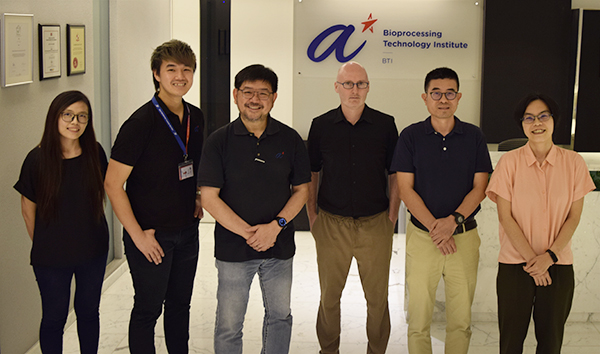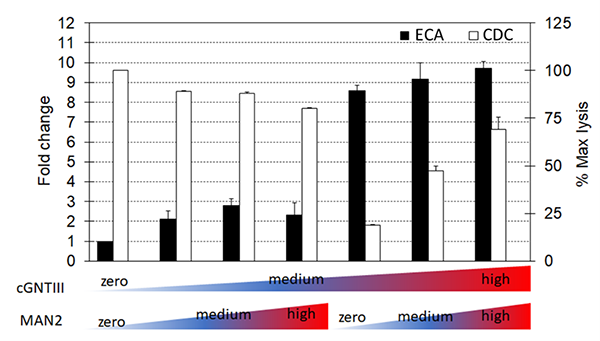
From Left: Ms Tay Shi Jie, Dr Zach Pang, A/Prof Andre Choo, Dr Ian Walsh, Dr Yang Yuansheng, Dr Leung Hau Wan
Science
Monoclonal antibodies (mAbs) play a crucial role in eliminating cancer cells through mechanisms like antibody-dependent cell-mediated cytotoxicity (ADCC) and complement-dependent cytotoxicity (CDC). These mechanisms are influenced by N-glycan structures on the Fc region, and modifying these glycan structures can optimize therapeutic benefits. However, conventional gene manipulation methods result in binary changes and lack precision in adjusting multiple genes at specific ratios.
To address this issue, we have developed a CHO cell engineering platform that allows precise modulation of multiple gene expressions for tailored N-glycan profiles 1. By integrating genes at two predetermined genomic sites using polycistronic vectors, we can achieve varied bisecting and non-fucosylated structures in mAbs. This strategy facilitated the production of engineered mAbs with diverse effector functions, thereby demonstrating the platform's potential in advancing metabolic engineering for personalized antibody therapeutics.
Societal Impact
The importance of understanding and manipulating the glycan structures on mAbs lies in the potential to optimize their therapeutic benefits in eliminating cancer cells. The effector mechanisms, such as ADCC and CDC are critical for the effectiveness of mAbs in targeting cancer. By manipulating the N-glycan structures on the Fc region of mAbs, we can fine-tune and enhance these effector functions, potentially improving the precision and efficacy of cancer treatment. This molecular-level optimization opens avenues for developing more effective and personalized antibody therapeutics, contributing to advancements in cancer therapy.
Technical Summary
Our study addresses a gap in glycoengineering research, emphasizing the need to modulate the expression levels of multiple genes for desired glycan structures. By co-expressing rituximab with glycosyltransferase genes cGNTIII and MANII, we achieved rituximab IgG1 production with distinct glycan profiles and enhanced biological activities. Adjusting cGNTIII and MANII expression levels led to increased non-fucosylation without compromising galactosylation, resulting in modified IgG1s with improved effector cell activation.
The work also contributes to understanding the regulatory role of chimeric GNTIII and MANII enzymes in bisecting and non-fucosylated glycans. Our results demonstrate that MANII, when co-expressed with cGNTIII, effectively reduces the abundance of hybrid bisecting N-glycans in a dose-dependent manner. These findings support observations indicating that co-expression of chimeric GNTIII and MANII can generate bisecting non-fucosylated glycans without hybrid forms, enhancing ADCC efficacy while preserving CDC activity.

Figure 1. High cGNTIII expression leads to improved Effector Cell Activation (ECA) activity in modified rituximab compared to the control. The weakened CDC functions observed in high-expressing cGNTIII pools can be mitigated by increasing the expression of the MANII gene. Co-expression of MANII and cGNTIII genes at high levels produces rituximab with enhanced ECA while maintaining CDC activity.
References
1. Nguyen, N. T. B. et al. Optimizing effector functions of monoclonal antibodies via tailored N-glycan engineering using a dual landing pad CHO targeted integration platform. Scientific Reports 2023 13:1 13, 1–14 (2023).